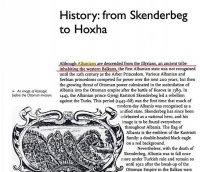R
Rigel Kent
Гостин
Kolku si ogranicen i patetika , cudo nevideno , "logikata" tvoja se vide kolkava e. Jas da ti dokazuvam koj sum ,ti si opsednat od "dokazuvanje", inaku jas pocnav ,drugar ti Misirkov izbrisa se , toa e tvojata i od Misirkov "logika".Zatoa sedi si mirno da ne pocnam jas da baram necie poteklo pa od nemoznost za odgovor brisi i modeliraj odgovori.
Ajde ke odime po tvojot "metod" na stupidno povrzuvanje.
Prevedi go tekstov , i ne go izbegnuvaj prevodot!
"the protophedrod Duke Basiliakes , who had been sent there by emperor , having succeeded in avoiding Bryennius and withdrawing from Andrianople , took over Durres and assembled an army there from all surrounding regions .By soliciting support for his side by means of substantial gifts , he succeeded in having the Franks enter his tetitory from Italy and attempted to make use of them for his side. By various pretences and means , he collected money from everyone under his order and command , set up a list and used as a pretext for this arms buildup the fact that he intended to attack Bryennius as a renegade.Once he had ensured that he had indeed assembled a large army and forces fit for action , composed of Byzantine Greeks , Bulgarians , and Albanians(Αρβανιτων)and of his soldiers he set off and hastened to Thessalonika."
...................................................................................................
Nikoj ne moze da ospori deka del od denesnite Albanci se avtohtoni , so kogo se izmesale podocna toa e predmet na analiza.
Ajde ke odime po tvojot "metod" na stupidno povrzuvanje.
Prevedi go tekstov , i ne go izbegnuvaj prevodot!
"the protophedrod Duke Basiliakes , who had been sent there by emperor , having succeeded in avoiding Bryennius and withdrawing from Andrianople , took over Durres and assembled an army there from all surrounding regions .By soliciting support for his side by means of substantial gifts , he succeeded in having the Franks enter his tetitory from Italy and attempted to make use of them for his side. By various pretences and means , he collected money from everyone under his order and command , set up a list and used as a pretext for this arms buildup the fact that he intended to attack Bryennius as a renegade.Once he had ensured that he had indeed assembled a large army and forces fit for action , composed of Byzantine Greeks , Bulgarians , and Albanians(Αρβανιτων)and of his soldiers he set off and hastened to Thessalonika."
...................................................................................................
Nikoj ne moze da ospori deka del od denesnite Albanci se avtohtoni , so kogo se izmesale podocna toa e predmet na analiza.





